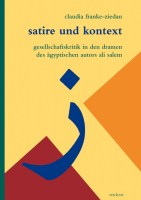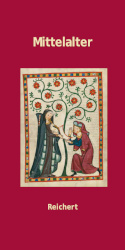Search
Satire und Kontext
Gesellschaftskritik in den Dramen des ägyptischen Autors Ali Salem
2013
17.0 x 24.0 cm, 272 p., hardback
ISBN: 9783895009396
17.0 x 24.0 cm, 272 p., hardback
69,00 €
ISBN: 9783895009396
Short Description
This study examines the dramas of the Egyptian writer Ali Salem (b. 1936). In addition to determining Salem’s position in literary history and outlining developments in modern Arab theatre, the contemporary dramatist’s plays written in Egyptian dialect are given detailed consideration. Specifically, the satirical style of these texts is analyzed, enabling the socio-critical potential of these stage works to be identified and gauged.Description
The playwright Ali Salem (born 1936) is considered to be one of the most important contemporary Egyptian satirists. The main concern of this study is to undergo a detailed analysis of the satirical writing style of this author. In order to do this, three of Ali Salem's stage works are examined at the levels action design, character design and example of dramatic language. Taking into account the political and social circumstances in the current context of the pieces, the means for producing literary satire will be revealed on these three levels. The dramas selected for exemplary analysis are from different eras of modern Egyptian history and each deal with a problem or an event from the real context. The author demonstrates these problems critically or makes them ridiculous through his satirical writing. The first of the studied dramas was written during the reign of Egyptian President Gamal Abdel Nasser. In this piece, Ali Salem attacks – in an encrypted way – the suppression of free speech through government censorship. The second drama was created during the presidential regime of Anwar as-Sadat. It criticizes the liberal economic policies of Nasser's successor, of which only a few Egyptians benefited, whereas the majority of the Egyptian population impoverished. The author denounces the unwillingness of state leaders to take action against the increasing impoverishment of the Egyptian middle class and the serious abuses in the country. The third drama, which is analyzed in detail, focuses on the apostasy charge forced divorce, which was imposed in the 1990s on the known Egyptian Islamic scholar Nasr Hamid Abu Zaid. With the means of literary satire, the ridiculousness of this event is revealed and religious intolerance is scourged. To succeed in the analysis of the satirical style of Ali Salem, the study takes into account the various facets of research discussed around the concept of satire, and leads to other examples of Arab writing that use the resource of literary satire to refer to real circumstances of their developmental contexts.In addition to the detailed analyzes of the three plays, the study contains a chronological overview of the dramatic works of Ali Salem, with references to the respective references to reality and the literary agent. A detailed excursus is devoted to the controversial travelogue of Ali Salem, which emerged in the early 1990s as part of his trip to Israel.
The importance of this research lies in the fact that here, in monographic form, Ali Salem's works of drama are taken into view for the first time. In addition, the study presents a multi-layered process for the analysis of dramatic texts in terms of their satirical content.
Biographical Note
Geboren 1974; Studium der Islamwissenschaft, Arabistik und Deutsch als Fremdsprache in Bayreuth und Kairo von 1998-2004; 2004/2005 DAAD-Sprachassistentin an der Universität Helwan/Ägypten; Lehraufträge an der Universität Bayreuth; 2006-2010 DAAD-Lektorin an der Universität Aleppo; Promotion an der Universität Leipzig im Fach Arabistik; Lehraufträge am Orientalischen Institut der Universität Leipzig; DaF-Dozentin bei InterDaF am Herder-Institut der Universität Leipzig (im Moment: Elternzeit)Forschungsschwerpunkt: Moderne arabische Literatur




 Preface
Preface

 Neuerscheinungen 2023/2024
Neuerscheinungen 2023/2024
 Gesamtverzeichnis 2023/2024
Gesamtverzeichnis 2023/2024
 Katalog Oriental Studies & Linguistics
Katalog Oriental Studies & Linguistics
 Mittelalter
Mittelalter
 Deutsche Inschriften
Deutsche Inschriften
 Musiktherapie
Musiktherapie
 Literaturen im Kontext
Literaturen im Kontext